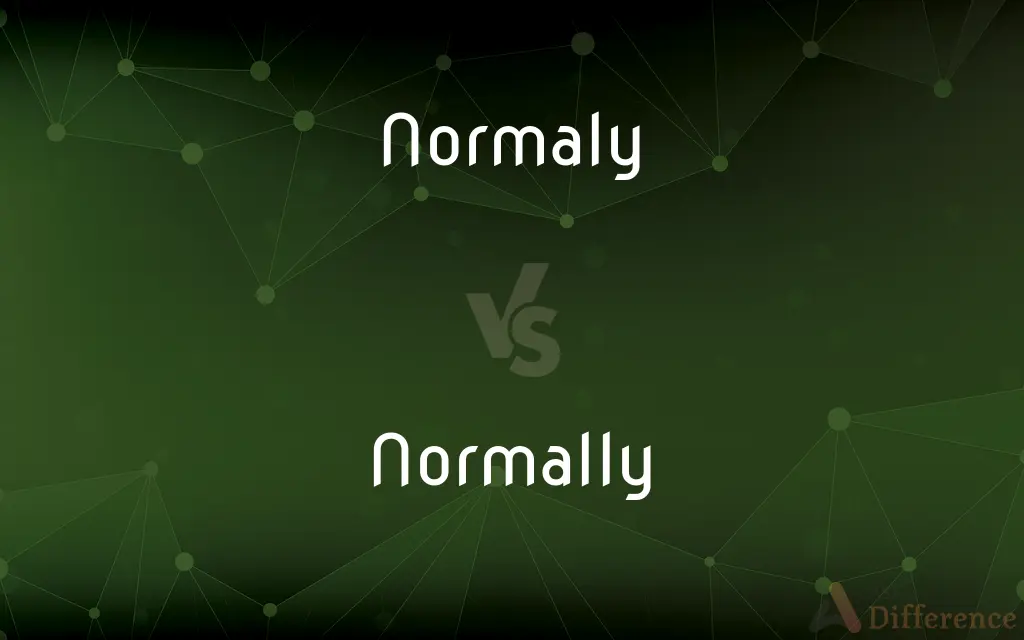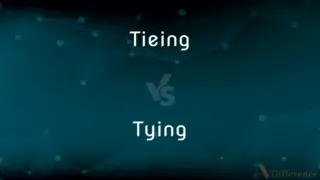Normaly vs. Normally — Which is Correct Spelling?
By Tayyaba Rehman — Updated on March 21, 2024
"Normaly" is incorrect. The correct spelling is "Normally," which refers to the usual or typical condition or manner.

Table of Contents
Which is correct: Normaly or Normally
How to spell Normally?

Normaly
Incorrect Spelling

Normally
Correct Spelling
ADVERTISEMENT
Key Differences
"Normal" has two 'l's when adding 'ly': "Normal" + "ly" = "Normally."
Visualize "normally" as the norm, followed by an ally.
Recall "usually" also ends with "ally," just like "normally."
"Mal" means bad in Spanish, and missing the second 'l' in "Normally" is a bad mistake.
Think of the word "formally" which also ends in "ally."
ADVERTISEMENT
How Do You Spell Normally Correctly?
Incorrect: The weather is normaly mild this time of year.
Correct: The weather is normally mild this time of year.
Incorrect: The shop is normaly closed on Mondays.
Correct: The shop is normally closed on Mondays.
Incorrect: We normaly have dinner around 7 pm.
Correct: We normally have dinner around 7 pm.
Incorrect: She normaly arrives at the office at 9 am.
Correct: She normally arrives at the office at 9 am.
Incorrect: He would normaly take the bus, but today he decided to walk.
Correct: He would normally take the bus, but today he decided to walk.
Normally Definitions
In a natural or anticipated manner.
When touched, the plant's leaves normally close.
In a manner that conforms to norms.
The machine is normally very quiet.
As a general rule or in most cases.
I normally don't eat dessert.
In a typical or usual manner.
She normally wakes up at 6 a.m.
Under normal or usual conditions; as a rule
Normally, it takes three or four years to complete the training
In a normal manner
Try to breathe normally
At right angles to a given line or surface.
Conforming with, adhering to, or constituting a norm, standard, pattern, level, or type; typical
Normal room temperature.
One's normal weight.
Normal diplomatic relations.
(Biology) Functioning or occurring in a natural way; lacking observable abnormalities or deficiencies.
Relating to or designating the normality of a solution.
Abbr. n Designating an aliphatic hydrocarbon having an acyclic unbranched chain of carbon atoms.
Being at right angles; perpendicular.
Perpendicular to the direction of a tangent line to a curve or a tangent plane to a surface.
Relating to or characterized by average intelligence or development.
Free from mental illness; sane.
The usual, expected, or standard state, form, amount, or degree
Temperatures have been above normal for this time of year.
(Mathematics) A perpendicular, especially a perpendicular to a line tangent to a plane curve or to a plane tangent to a space curve.
Under normal conditions or circumstances; usually; most of the time
Normally, I eat breakfast at 6am, but today, I got up late and didn't eat until 9.
In the expected or customary manner.
Lisa ate normally, until she realised that she was late for choir, when she sped up.
To a usual or customary extent or degree.
He was abnormally agitated, she only normally so.
In the manner of a variable with a Gaussian distribution.
In a normal manner.
Under normal conditions;
Usually she was late
Under regular conditions or circumstances.
The store is normally open until 9 p.m.
Normally Meaning in a Sentence
I normally start my day with a cup of coffee.
She normally studies in the library because it's quiet.
The store normally offers a discount on Tuesdays.
He normally takes his dog for a long walk in the evening.
He normally avoids eating sweets, but he made an exception today.
The park is normally crowded on weekends.
She normally prefers tea, but today she felt like having coffee.
The meeting normally lasts about two hours.
We normally go to my grandparents' house for Thanksgiving.
I normally check my emails first thing in the morning.
Traffic is normally heavy during rush hour.
Birds normally migrate south for the winter.
We normally have a team meeting every Monday morning.
The bus is normally on time, but it was late today.
He normally runs five kilometers every morning.
Restaurants in this area normally close by 10 pm.
She normally replies to messages promptly.
Children normally learn to read by the age of six.
Plants normally need sunlight and water to grow.
The museum is normally free on the first Sunday of the month.
Normally Idioms & Phrases
Normally requires
Typically needs or demands.
The application process normally requires submitting several forms of ID.
Normally includes
Usually contains or encompasses.
The job normally includes responsibilities like scheduling and budgeting.
Normally seen as
Generally considered or regarded in a certain way.
She is normally seen as the go-to person for project management.
Normally follows
Typically comes after or results from.
Rain normally follows a sudden drop in atmospheric pressure.
Normally considered dangerous
Usually thought to be risky or unsafe.
Climbing without proper gear is normally considered dangerous.
Normally the case
Typically or usually the situation.
It's normally the case that flights are more expensive during holiday seasons.
Normally lasts until
Typically continues until a specific time or event.
The festival normally lasts until midnight.
Normally associated with
Commonly connected or linked to.
That level of dedication is normally associated with high achievers.
Normally involves
Typically entails or includes.
Preparing a good presentation normally involves a lot of research.
Normally leads to
Usually results in or causes.
Good communication normally leads to better teamwork.
Normally taken as
Often interpreted or understood as.
Silence is normally taken as agreement, but that's not always the case.
Normally found in
Usually located or present in.
This species of bird is normally found in tropical regions.
Normally filled with
Usually full of or containing.
The park is normally filled with joggers and cyclists in the morning.
Normally covered by
Usually included or dealt with in.
These topics are normally covered by the introductory course.
Normally reserved for
Usually kept or set aside for a particular purpose or person.
These seats are normally reserved for VIP guests.
Normally busy with
Usually occupied or engaged in.
Around this time of year, she's normally busy with budget planning.
Normally expected to
Typically supposed or anticipated to.
You're normally expected to wear formal attire to the gala.
Normally seen with
Commonly observed or noted with.
High levels of stress are normally seen with tight deadlines.
Normally starts at
Typically begins at a certain time.
The concert normally starts at 8 pm, but there might be a delay.
Normally recommended for
Usually suggested or advised for.
This type of exercise is normally recommended for beginners.
Common Curiosities
Why is it called Normally?
It's called "Normally" because it describes a condition or manner that conforms to what is usual or typical.
What is the pronunciation of Normally?
It is pronounced as /ˈnɔːr.məl.i/.
What is the verb form of Normally?
"Normally" is an adverb and doesn't have a verb form. The related verb would be "normalize."
What is the root word of Normally?
The root word is "normal."
Which vowel is used before Normally?
The vowel "a" is commonly used, as in "a normally busy street."
What is the singular form of Normally?
"Normally" is an adverb and does not have a singular form. It remains "normally."
Which preposition is used with Normally?
Depending on the context, various prepositions can be used with "normally." For example, "normally in the mornings" or "normally under these conditions."
Is Normally a noun or adjective?
Neither. "Normally" is an adverb.
What is the plural form of Normally?
Adverbs do not have plural forms, so "normally" remains the same.
Which article is used with Normally?
Being an adverb, "normally" typically does not take an article directly. However, in contextual phrases, "a" or "the" might appear, e.g., "a normally quiet child."
Is Normally a negative or positive word?
"Normally" is neutral; it is neither negative nor positive.
Is Normally an abstract noun?
No, "normally" is not an abstract noun.
Is the Normally term a metaphor?
No, "normally" is not typically used as a metaphor.
Is Normally an adverb?
Yes, "normally" is an adverb.
Is Normally a vowel or consonant?
"Normally" is a word, consisting of both vowels and consonants.
Is Normally a countable noun?
No, "normally" is an adverb and is not counted.
Is Normally a collective noun?
No, "normally" is not a collective noun.
What is the opposite of Normally?
The opposite could be "abnormally" or "unusually."
Which determiner is used with Normally?
Being an adverb, "normally" typically doesn't take a determiner.
Which conjunction is used with Normally?
Conjunctions such as "and" or "but" can be used, depending on the sentence.
How do we divide Normally into syllables?
It can be divided as nor-mal-ly.
What is a stressed syllable in Normally?
The stressed syllable is "nor" in "normally."
What is the second form of Normally?
As an adverb, "normally" doesn't have verb forms. For the verb "normalize," the past tense is "normalized."
Is the word Normally imperative?
No, "normally" is not imperative.
What part of speech is Normally?
"Normally" is an adverb.
What is another term for Normally?
Another term could be "usually."
What is the first form of Normally?
"Normally" is an adverb and doesn't have verb forms. The related verb "normalize" has its base form as "normalize."
How many syllables are in Normally?
There are three syllables in "normally."
What is the third form of Normally?
As an adverb, "normally" doesn't have verb forms. For the verb "normalize," the past participle is "normalized."
How is Normally used in a sentence?
"He normally arrives at work by 8 a.m."
Share Your Discovery

Previous Comparison
Extremly vs. Extremely
Next Comparison
Dissappoint vs. DisappointAuthor Spotlight
Written by
Tayyaba RehmanTayyaba Rehman is a distinguished writer, currently serving as a primary contributor to askdifference.com. As a researcher in semantics and etymology, Tayyaba's passion for the complexity of languages and their distinctions has found a perfect home on the platform. Tayyaba delves into the intricacies of language, distinguishing between commonly confused words and phrases, thereby providing clarity for readers worldwide.














































